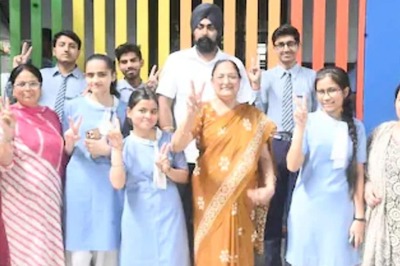
views
Budget Speeches are given every year by the Finance Ministers however there are speeches that bring humungous change with the dexterity they are spoken with and big plans they unfold. Let us take you through 8 such budget speeches that changed India's economy:
1. 1947 - Independent India's First Budget Speech by FM R.K. Shanmukham Chetty
The burden of partition loomed large on Independent India's first budget that faced a fiscal deficit of Rs 24.59 Crores. Citing the rehabilitation of refugees, food crisis and security concerns that India faced, Finance Minister Shanmukham had stated, “If these special factors are taken into account it will be seen that we have not been living beyond our means or heading towards bankruptcy. I do not wish in any way to minimize our present difficulties or to underrate the effort required to surmount them but I have no doubt that once we reach fairly normal conditions and are able to reduce our Defence expenditure to peacetime proportions and curtail our reliance upon import of foodgrains we should be able to balance the budget. It will be too optimistic to expect normal conditions for the next year but I feel that with a determined all round effort we should be able to achieve this result in 1949-50.” The First Budget had an estimated revenue of Rs 171.15 Cores and expenditure of Rs 197.39 Cores out of which Rs 92.74 Crores was spared for the Defence budget.
2. 1951 Budget by FM John Mathai
This is the budget which laid the foundation of the Planning Commission in India to carry out phased plans for optimal economic growth of the country. Finance Minister John Mathai had stated, "It is necessary to undertake a review of our existing programme of development and our existing schemes of production. The geographical and economic facts on which the present programme is based no longer hold good, the estimate of financial resources on which the existing programme is based is no longer valid, and public opinion rightly demands a different kind of approach to the whole problem of development. In view of these facts, Government has decided to set up a Planning Commission as announced by the President."
3. 1968 Budget by FM Morarji Desai
The 1968 Budget is often cited as People Centric Budget and eased the burden of Excise department and delegated self-assessment of excise duty to small and big manufacturers for ease of business. Finance Minister Morarji Ranchhodji Desai had stated, "For some time past 1 have been exercised over the administrative burden on the excise department and the complaints of abuse associated with the existing system of physical control. I have accordingly decided to extend the system of self-assessment by the manufacturers, to all manufacturers, big and small, making exception in respect of a few excisable commodities only which present complications in assessment or where there is substantial movement in bond. A large measure of trust will thus be placed in the manufacturers, their declarations and their accounts."
4. 1970-71 Budget by PM-FM Indira Gandhi
The 1970-71 Budget was set on the popular slogan 'Garibi Hatao' and the then Prime Minister as well as Minister of Finance Indira Gandhi rolled out anti-poverty programmes that turned India from a Revenue Surplus nation to Revenue Deficit country. In her Budget Speech, Indira Gandhi had stated, "It is generally accepted that social, economic and political stability is not possible without the growth of productive forces and the augmentation of national wealth. Also, that such growth and increase in wealth cannot be sustained without due regard to the welfare of the weaker sections of the community. Therefore, it is necessary to devise policies which reconcile the imperatives of growth with concern for the well-being of the needy and the poor. Measures have to be devised which, while providing welfare, also add momentum to productive forces."
5. 1986 Budget by FM VP Singh
The 1986 Budget is popularly known as the Carrot and Stick Budget in which then Finance Minister VP Singh introduced Modified Value Added Tax - MODVAT Credit. The idea of tax credit was born during this budget to lessen the cascading effect of taxes on the end consumer. The 1986 Budget also tightened the noose on tax evaders including industrial magnate Dhirubhai Ambani. The FM had stated, "In excise taxation a vexatious question which has been often encountered is the taxation of inputs and the cascading effect of this on the value of the final product. The Long Term Fiscal Policy had stated that the best solution would be to extend the present system of proforma credit to all exciseable commodities with the exception of a few sectors with special problems like petroleum, tobacco and textiles. This scheme, which has been referred as Modified Value Added Tax (MODVAT) scheme - I shall stress MODVAT, not MADVAT - allows the manufacturer to obtain instant and complete reimbursement of the excise duty paid on the components and raw materials." Also adding, "The Government has launched an intensive drive against smugglers, black marketeers and tax evaders. There cannot, and will not, be a compromise on this score. Those who abuse the nation’s trust must be dealt with firmly and with full force of the law."
6. 1991 Budget by FM Manmohan Singh
The Epochal Budget as it was called, transformed India's Ex-Im policy. The country was going through a precarious balance of payments. The then Finance Minister Manmohan Singh had stated, "There is no time to lose. Neither the Government nor the economy can live beyond its means year after year. The room for maneuver, to live on borrowed money or time, does not exist anymore. Any further postponement of macro-economic adjustment, long overdue, would mean that the balance of payments situation, now exceedingly difficult, would become unmanageable and inflation, already high, would exceed limits of tolerance. For improving the management of the economy, the starting point, and indeed the centre-piece of our strategy, should be a credible fiscal adjustment and macro-economic stabilisation during the current financial year, to be followed by continued fiscal consolidation thereafter. This process would, inevitably, need at least three years, if not longer, to complete. But there can be no adjustment without pain. The people must be prepared to make necessary sacrifices to preserve our economic independence and restore the health of our economy."
7. 1997 Budget by FM P. Chidambaram
Popularly referred as the Dream Budget, the 1997 budget presented by Finance Minister P. Chidambaram aimed at increasing the tax base of the country. Moderate tax rates and Voluntary Disclosure of Income Scheme or VDIS were the highlights. While changing the tax rates improved India's tax collections vastly from mere Rs 18,700 Crores in 1997-98 to massive Rs 100,100 Crores in 2010-11, the VDIS campaign collected Rs 10,000 Crores. "I believe that the time is opportune to introduce a Voluntary Disclosure Scheme. This would be a simple scheme where, irrespective of the year or the nature or the source of the funds, the amount disclosed, either as cash, securities or assets, whether held in India or abroad, would be charged at the revised highest rate of tax. Interest and penalty will be waived. Immunity will be granted from any action under the income-tax, Wealth tax and Foreign Exchange Regulation Acts. The date of commencement of the scheme will be notified separately, but the scheme will end on December 31, 1997," the Finance Minister stated in his budget speech.
8. 2000 Budget by FM Yashwant Sinha
The Millennium Budget presented by Finance Minister Yashwant Sinha promoted India as a Software Development hub leading to an exponential growth of Indian IT Industry and its positioning as the software exporter on the global map. The FM had stated “Exports have achieved a remarkable turnaround from negative growth last year to nearly 13% growth in dollar terms in April-December, 1999. Our software exports are also booming. Although surging international oil prices have increased our oil import bill by more than $6 billion, our foreign exchange reserves have nevertheless attained new record levels. With the return of investor confidence our stock markets have also soared to new heights."




















Comments
0 comment